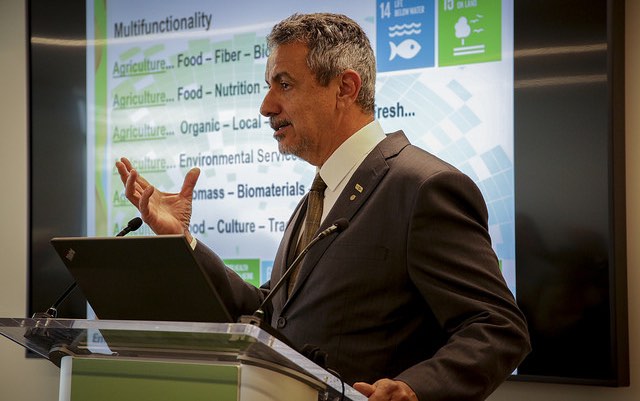The agricultural changes in Brazil, Asia, and the United States in recent decades offer key lessons for the task of transforming global food systems to address issues such as climate change, malnutrition, and inequity, according to participants in a May 15 IFPRI seminar.
Embrapa Labex-USA Coordinator Geraldo B. Martha Jr., began the discussion focusing on Brazil’s dramatic agricultural expansion. While the sector has experienced growth in the last decade, it isn’t alone in this new chapter of innovation. “This approach of a science-based agriculture is actually happening everywhere in the world,” Martha said.
Maurício Antônio Lopes, president of Embrapa (the Brazilian Agricultural Research Corporation), first reviewed the transformation of Brazil’s agriculture starting in the 1970s, driven by investments agricultural science. When Embrapa was established in 1973, the cerrado—Brazil’s large savanna biome—was considered unsuitable for farming due to its acidic, nutrient-poor soils. The addition of lime (crushed limestone and chalk) boosted fertility, while the development of new variety of soybean that could thrive in a tropical climate raised yields. These innovations increased both the area of available farmland and the productivity of existing farmland in Brazil.
“Today we are initiating in Brazil what I call a second big revolution to move our agriculture toward sustainability,” Lopes said—meeting Sustainable Development Goals under the challenges of climate change. Lopes cited two main efforts. To combat deforestation, Brazil is requiring stricter adherence to its decades-old Forest Code mandating that landowners maintain a proportion of their property under native vegetation. The country’s Low Carbon Agriculture Plan, meanwhile, relies on an integrated system of farming, forestry, and livestock in which trees are planted between fields whose use rotates. This system intensifies land use for efficiency, reduces emissions, and eases the pressure to expand into protected forest.
Brazil is not alone in confronting tensions between agricultural growth and sustainability. IFPRI Director General Shenggen Fan explored the challenges and opportunities in Asia, noting that the agricultural sector is “part of the challenge, part of the problem” contributing to burdens of malnutrition and high carbon emissions.
However, technological innovation both inside and outside agriculture can transform the sector, Fan said. For example, evidence-based technologies can boost yields: Remote sensing in precision agriculture efficiently collects data so that water, fertilizer, and pesticides can be applied in precise amounts at the right time for increased productivity. China’s G20 Initiative provides another example of technology with impact, an e-commerce network that connects rural farmers to urban consumers by providing supply and demand information as well as access to credit. Fan also stressed the need for knowledge sharing and cooperation, so that more countries and institutions will be “empowered with evidence and supported by research.”
Mary Bohman, administrator for the U.S. Department of Agriculture’s Economic Research Service, walked through ERS data on productivity and farm consolidation in the United States. “Natural resources and technology are key influences around the world when you look at the [agriculture] transformation,” she said, “and they play an important role in the US experience.” Bohman showed how technological advances in the last 70 years, like higher-quality seeds and the mechanization of farming drive a larger trend of growth in productivity.
Bohman predicted that the long-term structural trend in the U.S. from smaller-scale to large and very large-scale farms would continue. One structure that won’t change? The family. Bohman attributed the longevity of the family-run farm as the key organizational structure for U.S. agriculture, perhaps because it provides a sense of trust and continuity in a rapidly changing marketplace.
Final speaker Marcos Sawaya Jank—president of the Asia-Brazil Agro Alliance and an IFPRI Board member—detailed the role of the food industry in Brazil’s productivity gains. Exports, he said, have experienced a “change in geography” in the past decade: Exports to China and to Asia as a whole have risen steadily.
Demand is shifting, creating new market opportunities, Jank said. Meat consumption in developing countries is rising, for example— particularly for poultry, increasing a rate of 3.9 percent per capita per year. But obstacles remain. The trade in meats faces more restrictions than than that for soybean—including tariff rate quotas, health regulations, and religious concerns.
“Today our food system, our agricultural system, still faces some challenges,” Fan said, concluding the event after a question and answer session. “Climate change, hunger, malnutrition, the degradation of natural resources. So what do we want? Yes, we want to have a more integrated food system, open trade, innovations, and not just in the agriculture food sector, ICT, AI, that can be used in our agriculture-food system to transform our food system. But we also want to make sure that the food system is very inclusive: Women, youth, and children must benefit.”
Grace Collord is an IFPRI Events Assistant.







